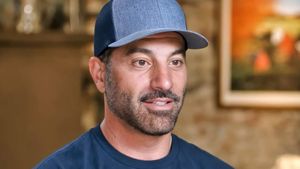CONTACTAbout UsCAREER OPPORTUNITIESADVERTISE WITH USPRIVACY POLICYPRIVACY PREFERENCESTERMS OF USELEGAL NOTICE
© 2025 Equal Entertainment LLC.
All Rights reserved
All Rights reserved
By continuing to use our site, you agree to our Privacy Policy and Terms of Use.
We need your help
Your support makes The Advocate's original LGBTQ+ reporting possible. Become a member today to help us continue this work.
Your support makes The Advocate's original LGBTQ+ reporting possible. Become a member today to help us continue this work.
COMMENTARY: Right now, there are hundreds of patients with a fatal disease being denied lifesaving treatment as a result of government health care rationing. This isn't happening in a third-world country, or Canada, but right here in the United States of America.
Imagine that you have been sick for weeks, maybe even months, and you haven't gone to the doctor. You are scared -- and worst of all you don't have insurance. When you finally do go, you get the news you had feared -- you've been diagnosed with a life-threatening disease. The good news is that the disease can be treated, that the disease can be managed, unfortunately, at a cost of as much as $20,000 a year. You are told that there is a government program that can provide treatment, but there is a waiting list, and it may be months or years before you will finally receive the medication that would keep you alive. Without treatment, you could die.
The disease is HIV/AIDS and the public program is the Ryan White CARE Act.
The federal government will spend $15 billion on AIDS treatment alone this year, yet due to the inefficiencies of the public-run program, thousands will not receive appropriate care. In recent years, two patients in West Virginia and five in Kentucky died while awaiting care on waiting lists for the RWCA AIDS Drug Assistance Program. Today there are 247 Americans on waiting lists for livesaving AIDS drugs in eight states. The number is expected to reach 500 by Christmas. Those on the ADAP waiting lists are disproportionately minorities and residents of rural areas.
Sadly, the waiting lists do not tell the whole story of how care is being rationed under this program. Many other ADAP patients, while receiving care, are being denied the best treatment. Fuzeon, the AIDS drug of last resort that has been successful in treating patients who no longer benefit from other drugs, for example, has been denied to ADAP patients in our nation's capital.
These shortcomings aren't simply the result of insufficient funds. An
investigation by the Government Accountability Office found that the
program was overpaying for many of the drugs it provided. The
Department of Health and Human Services Office of Inspector found that
tens of millions of dollars were going unspent at the same time as
patients languished on ADAP waiting lists. Additionally, millions of
dollars have been misspent on beachside junkets by AIDS executives and
bureaucrats or lost to fraud and abuse. In Puerto Rico alone, millions
of RWCA dollars never reached patients because they were embezzled.
These bureaucratic inefficiencies and mismanagement have literally cost lives.
Make
no mistake -- ADAP has saved and improved the lives of thousands of
Americans and was created because there was an urgent unmet need. When
AIDS was first recognized over two decades ago, many doctors were too
frightened of the new disease to even treat those afflicted with it, and
health insurance companies would drop those diagnosed with the AIDS
virus. Countless Americans were confronted with a dire situation, a
terminal illness, and no insurance or means to afford the care necessary
to stay healthy and alive.
The situation they faced is not all that different from what many Americans living with cancer and other diseases face today.
For
these patients, and those of us concerned about their well-being, the
attractiveness of a public plan to ensure care for those with no
insurance is understandable. But as we have seen with ADAP, a public
health program is not a panacea -- and ADAP is not the only troubled
public health program.
Medicare only recently began offering
seniors prescription drug coverage that had long been covered by
private plans, and no one would claim that those in Medicaid are
receiving the best possible care. Indeed, 40% of doctors currently
refuse to treat Medicaid patients. Medicare teeters on the verge of
bankruptcy, Medicaid is bankrupting state budgets, and both programs
are rife with billions of dollars of waste, fraud, and abuse.
With
our neighbors in need, no one should question that we have an
obligation to help those who lack access to quality, affordable medical
care. But how?
The best solution is to prohibit insurance
companies from discriminating against patients who are sick or who have
preexisting conditions. These are some of the very reasons why we have
insurance. Then we should give all Americans the same choices of health
care coverage enjoyed by members of Congress, who can select from more
than 10 different private health care plans. S. 1099, the Patients'
Choice Act, would guarantee that all Americans would be able to choose
the health care coverage that best meets their individual needs with
creating a new government program. The Patients' Choice Act will put
you, not insurance companies, bureaucrats, or politicians, in charge of
your own health care decisions.
We can and should work to make
sure that every man, woman, and child in this country has access to
quality, affordable health care. No one should be denied access to
health care that would improve or extend their life. The good news is
that we can do this. We can do it without creating an inefficient and
expensive government program and we can do it in such a way that
empowers individuals to take control of their own health care.
From our Sponsors
Most Popular
Bizarre Epstein files reference to Trump, Putin, and oral sex with ‘Bubba’ draws scrutiny in Congress
November 14 2025 4:08 PM
True
Jeffrey Epstein’s brother says the ‘Bubba’ mentioned in Trump oral sex email is not Bill Clinton
November 16 2025 9:15 AM
True
Watch Now: Pride Today
Latest Stories
Health policy expert to RFK Jr.: You can't ban trans youth care this way
December 18 2025 5:37 PM
12 lesbian thrillers and mysteries to binge & where to watch them
December 18 2025 4:36 PM
Netflix's 'Boots' season 2 plot revealed by producer amid cancelation
December 18 2025 4:33 PM
Charlie Kirk's accused killer, Tyler Robinson, on LGBTQ+ issues: It's complicated
December 18 2025 4:04 PM
Sacramento man still in coma six weeks after suspected anti-LGBTQ+ hate crime
December 18 2025 1:17 PM
RFK Jr. and Dr. Oz announce sweeping measures to ban gender-affirming care for trans youth
December 18 2025 12:19 PM
True
Texas city will remove rainbow crosswalks under orders from Trump administration
December 18 2025 11:07 AM
Six key takeaways from Trump's speech to the nation, including 'transgender for everybody'
December 17 2025 10:51 PM
Marjorie Taylor Greene’s bill criminalizing gender-affirming care for minors passes with Democrats’ support
December 17 2025 6:47 PM
True
I didn’t just run the world’s major marathons. I changed them
December 17 2025 4:31 PM
Pam Bondi wants FBI to offer bounties for ‘radical gender ideology’ groups, leaked memo shows
December 17 2025 3:17 PM
Rock Hudson had a 'legendarily large penis,' Armistead Maupin says
December 17 2025 3:05 PM




































































Charlie Kirk DID say stoning gay people was the 'perfect law' — and these other heinous quotes